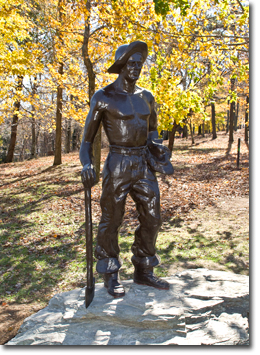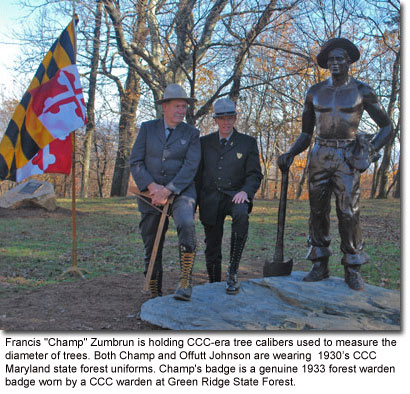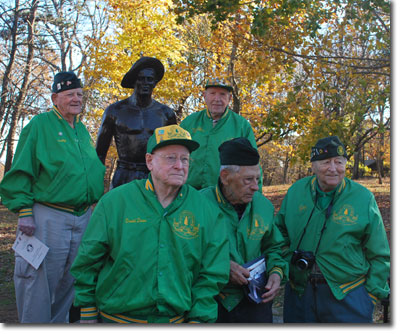To Honor The Civilian Conservation Corps
By Josh Davidsburg

Former Maryland Governor Harry Hughes, the Department of Natural Resources Secretary John Griffin and Maryland Park Service (MPS) dedicated the State's first Civilian Conservation Corps (CCC) Worker statue at
Gambrill State Park on November 5. The bronze statue recognizes CCC’s monumental contributions to the conservation and improvement of Maryland's public lands and natural resources.
“The Civilian Conservation Corps signifies that our State is growing in smarter, greener ways and showcases the hard work these Marylanders put into restoring and building many of our State Parks and Forests,” said Governor Martin O’Malley. “I am proud to honor them through this memorial and stewardship programs that continue their legacy.”
The dedication also fulfills a dream of Chapter 113 (Maryland Free State) of the former National Association of CC Alumni, now called the National Association of CCC Legacy. The Maryland Free State chapter was established in 1984 by former Maryland CCC members and their families. One of the chapter’s chief purposes has been to raise private donations and advocacy for the creation of the statue memorial in Maryland.
The purchase of the statue became possible as a result of a generous donation made this year by Potomac Edison, a First Energy Corporation and supporter of Maryland State Parks.

“Here in Maryland, two such programs proudly carry on the CCC legacy: the Maryland Conservation Corps, and the Conservation Jobs Corps,” said Hughes. “Today, young people from both of these programs are performing valuable work in our Parks – work that might not otherwise get done – and gaining valuable skills and experience to prepare and inspire them for higher education and fulfilling careers.”

CCC was among the first and most successful public works programs initiated by President Franklin D. Roosevelt in 1933 to rescue the nation from the Great Depression. For nine years, from 1933 to 1942, the program put over two million young men to work — 35,800 in Maryland — conserving natural resources and building many recreation facilities that Park visitors still enjoy. In Maryland, CCC companies built 274 bridges, nearly 3,500 erosion controls dams, planted 4.5 million trees and improved 60,000 acres of forest land. The CCC is considered the greatest public forest and park development effort in the nation’s history.

Visitors continue to enjoy many State Park facilities built by the CCC, from log cabins, campgrounds and picnic pavilions to recreation lakes, forests and trails. They also restored two massive stone historic State Park structures, Fort Frederick and Washington Monument. Popular State Parks improved by the CCC include: Swallow Falls, Herrington Manor, New Germany, Big Run, Cunningham Falls, Cedarville, Fort Frederick, Washington Monument, Gambrill, Patapsco Valley, Elk Neck, and Pocomoke River.
Since 1984, MPS has continued the CCC tradition by managing two youth conservation corps programs – the Maryland Conservation Corps (MCC) and the Conservation Jobs Corps (CJC). The MCC, which Hughes helped to establish, gives young men and women life and job skills training and opportunities to restore natural and cultural resources and conduct interpretation and environmental education for children and families in State Parks. The CJC, created by Governor O’Malley, provides at-risk youth in some our most disadvantaged areas a chance to do valuable work in State Parks while connecting with a natural world that is foreign to many.
Dedication Ceremony
Click here for more information and directions to
Gambrill State Park.
For additional information about the Civilian Conservation Corps in Maryland, click on the links below:
Acknowledgements: Story by Josh Davidsburg; Photos by Roberta Dorsch
Back to Feature Stories